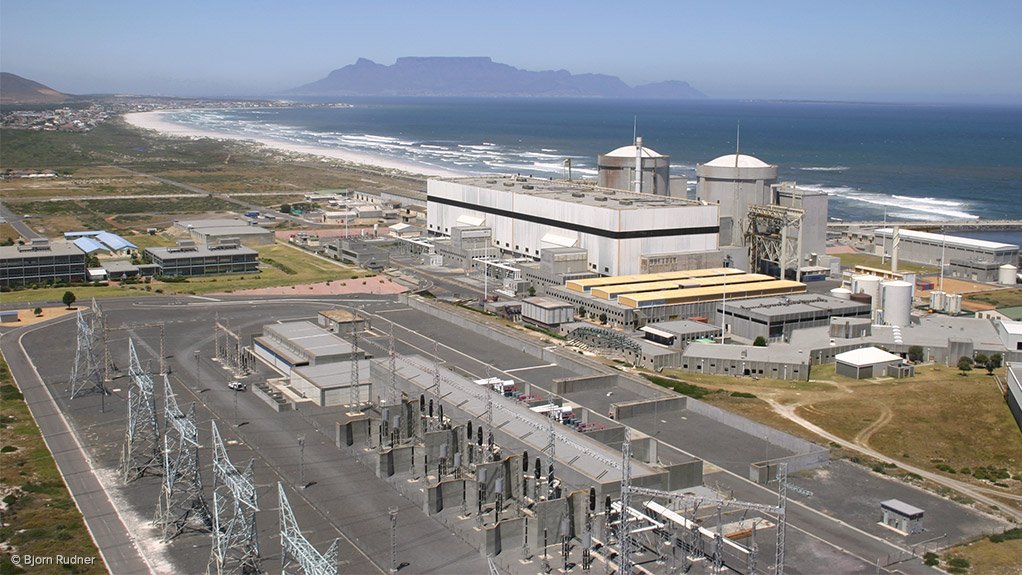South Africa’s National Nuclear Regulator (NNR) board has approved a 20-year life extension for Koeberg Unit 1, but has deferred a decision on the nuclear power station’s Unit 2 until late 2025, owing to the fact that an assessment of the second reactor’s safety case is still ongoing.
The decision, which was announced on July 15, came only days ahead of the July 21, 2024 expiry of Unit 1’s existing licence and effectively extended its operating life until July 21, 2044.
The licence variation is expected to be issued soon and allows for the “seamless” operation of Unit 1, as no conditions were included requiring Eskom to proceed with a shutdown that had initially been scheduled to begin on July 21.
In January, the NNR also confirmed that it had agreed to Eskom’s request to separate the Unit 1 and 2 licences to align with their respective commercial operating dates, with Unit 1 having started operating in July 1984 and Unit 2 in November 1985.
For this reason, Unit 2’s existing licence will remain in place until November 9, 2025, providing the NNR board with additional time to make an assessment on the life extension of the second reactor.
Unit 2 is currently undergoing an extended shutdown that includes the replacement of its three steam generators, a key requirement for any long-term extension of the reactor’s operating life.
NNR CEO Ditebogo Kgomo said the board had made the decision to approve Unit 1’s life extension in line with governing legislation, international safety standards and following a public participation process, which included eight public hearings.
Eskom had applied for the extension on May 10, 2021, together with a request for a separation of the Unit 1 and 2 licences to enable the ongoing operation of Unit 2 beyond July 21, 2024.
The decoupling of the licences was granted by NNR on January 25 this year.
“With regards to the representations received during public consultations, we found that the substantive concerns raised on health, safety and environment were adequately addressed by the licence conditions and/or the safety case,” Kgomo said during a briefing.
She said the installation of a core catcher was not a requirement of the Unit 1 licence extension and argued that it was also not the case for other second-generation reactor extensions globally. This, despite indications that it is indeed a requirement for the life extension of such reactors in France.
Kgomo added that the NNR’s technical review concluded that Eskom’s Long Term Operation (LTO) application was compliant with LTO regulations concerning the following: the submission of the safety case for long-term operation; factors related to safety-related programmes; effectiveness of the aging-management programme; the utilisation of the periodic safety review; and the programme for long-term operations with respect to the revalidation of time-limiting aging analysis.
“The NNR review found that the application is compliant for Unit 1,” Kgomo said, adding that the review of some aspects of the revalidation of time-limiting aging analysis on Unit 2 was ongoing.
NNR’s Peter Bester confirmed that there was no requirement for Eskom to proceed with the shutdown currently scheduled for July 21, adding that concerns regarding cracks found in the containment buildings had been considered as part of the life-extension approval process.
“So, there's no need, in fact, to shut down the plant for repair and maintenance work,” Bester added.
Eskom later confirmed that it would continue to operate the 930 MW unit until January 2025, when the it would be shut down for its next scheduled refuelling and maintenance outage.
Eskom added that once the current Unit 2 outage was completed it would be returned to service, with the NNR decision regarding the LTO for Unit 2 to be made made prior to November 9, 2025.
Energy and Electricity Minister Dr Kgosientsho Ramokgopa also welcomed the NNR announcement, saying the extension "will not only ensure the continued supply of electricity to meet the growing demand, but also contribute to our efforts in transitioning towards a cleaner, more affordable and sustainable energy future".
Meanwhile, South African Nuclear Energy Corporation Loyiso Tyabashe expressed confidence that the Unit 2 approval would follow, while arguing that the Unit 1 extension "guarantees South Africans a 20-year continuation of secure, clean and affordable energy".
EMAIL THIS ARTICLE SAVE THIS ARTICLE ARTICLE ENQUIRY
To subscribe email subscriptions@creamermedia.co.za or click here
To advertise email advertising@creamermedia.co.za or click here











